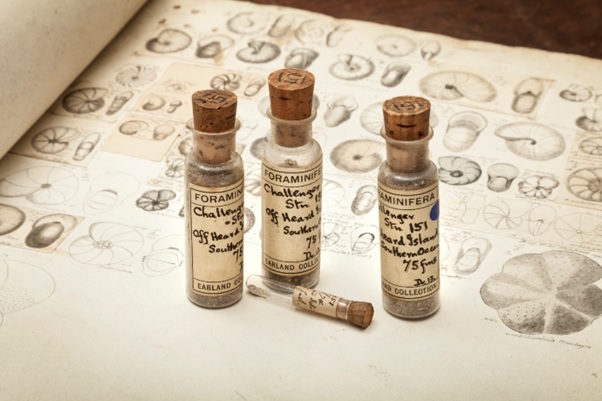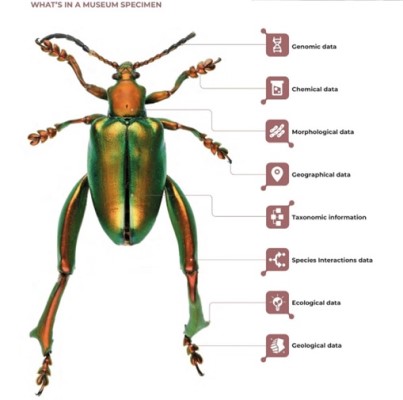Written by Jen Puller and Tara Wainwright, Natural History Museum / DiSSCo UK
The UK holds more than 137 million specimens across more than 83 institutions. These collections provide a unique insight into Earth’s natural history, enabling us to enhance our understanding of the natural world and therefore better protect it. Many specimens are of historical value, collected by influential naturalists and including rare or extinct species. However, most of these specimens lack a digital record, making them invisible to most scientists and the wider public.

DiSSCo UK is part of the UK’s contribution to DiSSCo, the Distributed System of Scientific Collections, a partnership of natural science collections from Europe working to unlock the potential of their collections through digitisation.
Digitisation is the process of converting physical information into a discoverable digital form. Vital information attached to the physical specimen such as the scientific name, discovery date and location, and in some cases, images of the specimen, can be released online and accessed by anyone, anywhere across the globe. This information is key to understanding how biodiversity has changed over centuries.
“Unlocking the potential of our collections requires a revolution in how we manage, share, and use the UK’s collections. If the data can be unlocked and shared on a global scale, they become a dynamic research tool to help find solutions to global challenges such as climate change, biodiversity conservation, and securing food for the future.” Vince Smith, Head of Data, Digital and Informatics at the Natural History Museum, London and lead for the DiSSCo UK Programme.

Unlocking UK collections
DiSSCo UK aims to unlock data from all UK natural science collections by developing a national programme of digitisation, developing the infrastructure needed to make the data created accessible to all, and helping institutions exploit the full potential of their digital collections.
The National Biodiversity Network Trust (NBN Trust), through the Network and NBN Atlas, is the national aggregator for biological observations, but the data published is focused on observations recorded in the UK. The needs of the Earth Sciences community and specialised collections such as frozen tissue collections are also not met via the NBN Atlas. DiSSCo UK aims to bridge these gaps by working with the Global Biodiversity Information Facility (GBIF) to host a national data portal, while also examining potential paths to accommodate the needs of the entire collections’ community. The learning experience and insights gained will be applicable to the NBN Atlas, enabling an improved infrastructure for all biodiversity data.
All data published by DiSSCo UK will be open and meet the FAIR (Findable, Interoperable, Accessible and Reusable) data standards. This will ensure that all specimen data will be suitable for research and can be easily combined with other data sources. We expect that the increase in specimen data being published will drive the audience searching for and using biodiversity data and provide a positive knock-on effect for use of data published through the NBN Atlas.
Uniting the recording community with historical collections
The challenges humanity and the planet face today cannot be answered by one community alone. Interdisciplinary collaboration is essential, with scientists, students, policymakers, and data professionals from varying backgrounds and expertise needed to work together to solve global challenges. Digitising the UK’s records has the potential to bring the UK recording community together with the nation’s historical collections.
Stronger links between the collections and recording communities not only benefits the science community, but local communities too. Museums often have strong relationships with local communities and are uniquely placed to connect with schools, volunteers, and citizen science programmes. Connecting communities to present-day biodiversity recordings and historical collections can improve awareness of changes to the local natural environment.
Find out more about DiSSCo UK on its website.
Come to the NBN Conference on 9 November 2022 to hear a talk by Vince Smith, Head of Data, Digital and Informatics at the Natural History Museum, London and lead for the DiSSCo UK Programme, on “Harnessing the power of the UK’s natural science collections”
